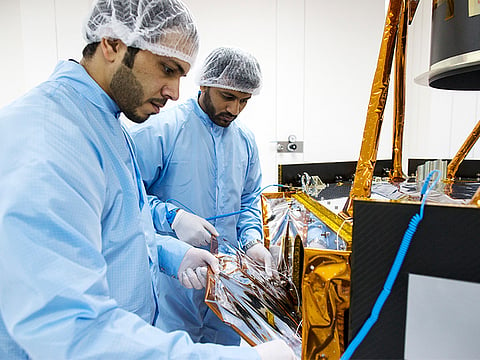The Emirati teams behind Emirates Mars Mission
UAE Mars team comprises around 75 Emiratis, who are divided into seven teams that are collectively in charge of all aspects of the mission

Dubai: Just like the UAE, the team behind launching Hope, the Emirates Mars Probe is young, ambitious and yearning to be on top.
In July last year, His Highness Shaikh Khalifa Bin Zayed Al Nahyan, President of the UAE, announced that the UAE will send an unmanned spacecraft to Mars by 2021, to coincide with the 50th anniversary of the UAE.
In April this year, His Higness Shaikh Mohammad Bin Rashid Al Maktoum, Vice-President and Prime Minister of the UAE and Ruler of Dubai, officially inaugurated the unveiling of the details of the Emirates Mars Mission. “Our science mission is to produce the first ever truly global picture of the Martian atmosphere. This is the first holistic study of the Martian climate and how the layers of atmosphere fit together,” Omran Sharaf, Emirates Mars Mission Project Manager, said in the video the event.
Completing the mission in just seven years, to become the first Arab country and the ninth country in the world to do so, is an ambitious goal for a young country like the UAE, so it was no surprise that the team behind turning this dream into a reality are a group of young, passionate Emiratis, who will do whatever it takes to take their country to the pinnacle.
The UAE Mars team comprises around 75 Emiratis, who are divided into seven teams that are collectively in charge of aspects of the mission. The seven teams include: Probe team, Product Assurance team, Science and Research team, Operations team, Ground Station team, Launch team and Strategic Planning team.
Key technologies will be designed, built and assembled locally, not imported. Technical knowledge will be developed in the UAE and transferred through collaboration with partners, not outsourced.
This approach ensures that the mission will leave behind a valuable and enduring legacy in the form of human capital: a generation of experienced scientists and engineers trained and inspired by the Mars mission.
The UAE government sees the Red Planet project as a turning point in the nation’s development. It will establish the space technology sector as a key economic sector for years to come.
Globally, space technologies are becoming increasingly important to the security and economy of nations. The sector is integral to many aspects of life from telecommunications and navigation to broadcasting and monitoring of weather and natural disasters.
To learn more about the team behind implementing the mission and how the mission will help build UAE capabilities in the space sector, Gulf News interviewed integral team leaders and members of the Mars Mission team.



